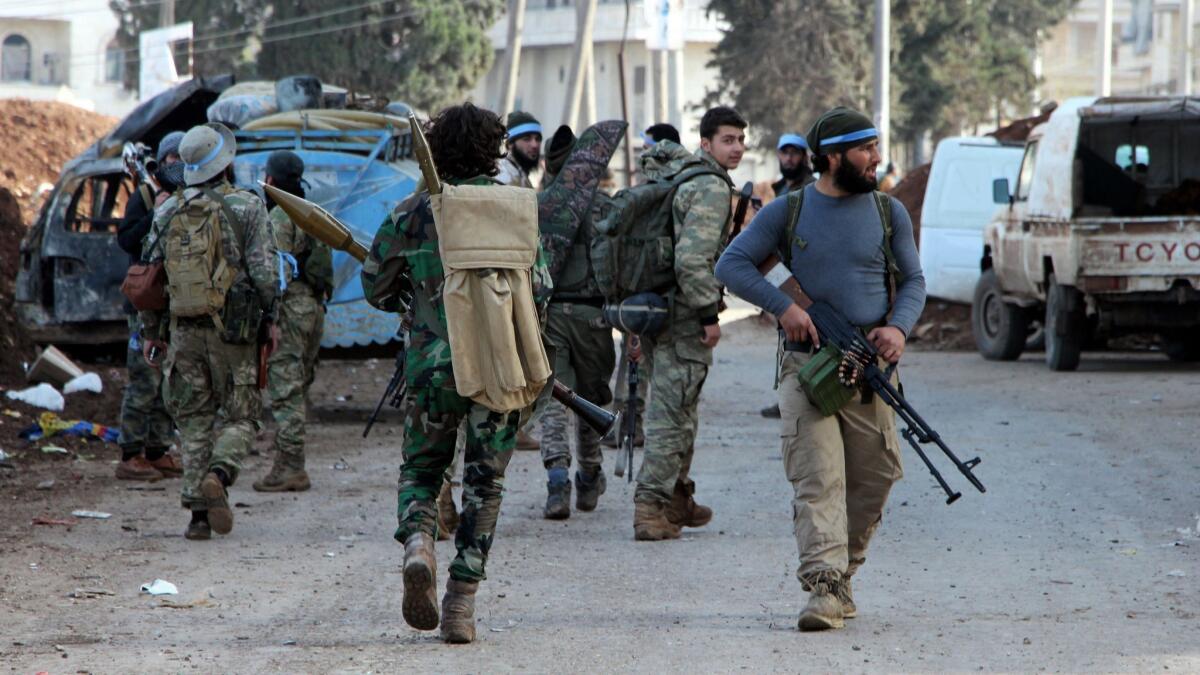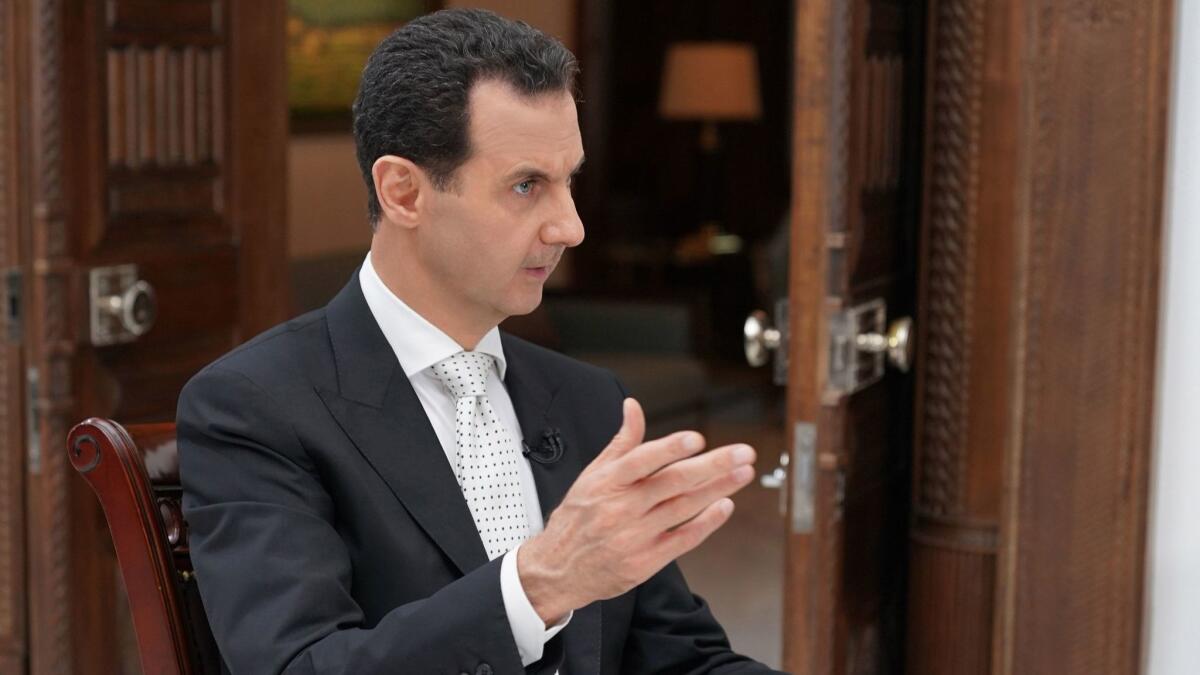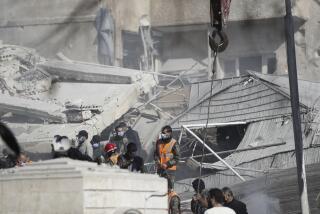Syrian forces battling Assad seek unity through the National Army

In the seven years he has fought to topple Syrian President Bashar Assad, opposition forces Col. Haitham Afisi’s beard has turned white and his voice has become a deep rumble.
The tall, muscular colonel, however, remains familiar to many Syrians, and someone to admire for those who oppose the Assad government.
Days after fighters under his command had joined with Turkish forces in March to wrest a corner of northwestern Syria away from rival Kurdish forces, Afisi, 58, spent some time greeting patrons at a cafe on the outskirts of Gaziantep, Turkey.
The city of Gaziantep, 32 miles from the border, is a hub of the Syrian opposition, providing offices for nongovernmental organizations and a Turkish location for the Syrian Interim Government, a group formed by leaders in exile headquartered in Azaz, Syria.
As Afisi sat drinking tea and smoking cigarettes during a busy dinner period, several passersby walked up to him to say hello. He planned to stay in Turkey for a day before returning to the opposition-controlled Syrian city of Afrin.
“We have gotten more popular since these operations” with Turkey began, Afisi said during a recent hourlong interview. “Even in regime-controlled areas there are calls for people to join new brigades now.”
Since allying themselves with neighboring Turkey in 2016, Afisi and other fighters belonging to some of the more moderate rebel factions arrayed against Assad have been granted a new lease on life.
A new, unified force, dubbed the National Army, was announced in December and is receiving funding and training from Turkey. But its attempts to forge a united front against Al Qaeda-affiliated factions and to establish an alternative to Assad’s government have been beset by infighting.
Maintaining discipline and loyalty within their ranks has been an elusive goal for the rebels since the start of the multi-sided civil war in 2011, when officers such as Afisi, who served in the Syrian air force, quit and announced they would form the Free Syrian Army, hoping to protect protesters across the country calling for Assad’s ouster.
In the years since, the rebels have seen funding and weapons from foreign backers come and go, and lost members to less moderate factions.
In 2014, Afisi’s son, a commander in a rebel brigade in the Idlib countryside, was kidnapped and held for nearly two years by the former Al Nusra Front, an Al Qaeda-affiliated rebel faction now known as the Organization for the Liberation of Syria. Al Nusra killed hundreds of rebels from U.S.-backed factions such as Afisi’s 51st Brigade and went on a kidnapping and killing rampage targeting activists and civilians who served in local councils set up to administer the rebel-held area.

Support for Assad from Russia and Iran, meanwhile, shrank the space the rebels controlled in Syria, leaving Idlib province the last major opposition stronghold. Al Nusra became the dominant force in Idlib in 2017 and formed a new umbrella group that drew fighters from various factions in the Free Syrian Army.
They included fighters backed by Washington, who took equipment such as antitank missiles with them to join Al Nusra. Washington put an end to backing the Free Syrian Army in Syria, including those under Afisi’s command, and shifted its focus on training Syrian Democratic Forces, or SDF, a mix of Kurdish and Arab fighters whose main goal was not to topple Assad, but to defeat the militant group Islamic State.
In March, the National Army, an alliance of 37 groups of about 30,000 fighters under Afisi’s command, took part in Turkey’s Operation Olive Branch, a two-month battle that succeeded in pushing Kurdish rebels out of the northwestern Syrian district of Afrin.
Turkey considers the Kurdish militia that controlled Afrin an offshoot of the Kurdistan Workers Party, or PKK, which has fought a decades-long insurgency in Turkey and been designated as a terrorist organization by the United States. The families of Turkish-allied rebels killed in the operation have been promised Turkish citizenship.
“It was a very successful battle, we managed to eject the terrorists without causing much damage or killing innocent people,” said Muhammad Atarib, part of the 9th Division, one of the groups that took part in the battle, who was reached by phone in Afrin. “As a Syrian, I hope the operations with Turkey will continue, and we will liberate other areas as well.”
The Turkish-backed victory in Afrin links the area with a strip of northern Syria that the same forces took from Islamic State in 2016, in what Turkey called Operation Euphrates Shield. About 75 miles of the Turkey-Syria border is now controlled by the forces, free from airstrikes and attacks from the Syrian government and its allies.
The impetus for the 2016 operation came from the Turkish government in Ankara, which sought to eject Islamic State from its border, while commanders such as Afisi hoped to carve out an area of control to use as a base for their fight against Assad.
At a headquarters in Syria used by Turkish special forces, Afisi and dozens of other rebel commanders decided to form a unified structure, calling themselves the National Army.
“People welcomed it, we needed unity, we needed backing,” Afisi said. “Fighters of course need food, they need water, they need weapons, supplies, and so when the U.S. cut us off, we had to turn to Turkey.”
Turkey pays the salaries of the National Army fighters, about $150 a month, and has set up military bases in Syria to train them.
Turkey’s effort to stabilize the areas under its control in northern Syria have also benefited civilian opposition groups, who have thrown their lot in with Ankara, hoping to use the opportunity to demonstrate their ability to govern.
After rebel groups took part in Turkey’s Operation Euphrates Shield, which resulted in Turkey’s occupation of northern Syria, the Syrian Interim Government was chosen by Ankara to help control areas formerly under Islamic State. The arrangement provided at least nominal control between the city of Jarabulus, and the city of Azaz, a key waypoint for supplies coming from the Turkish border crossing at Bab Salameh.
The Syrian Interim Government last year announced its prime minister, Jawad Abu Hatab, a heart surgeon, would serve as defense minister and oversee the new National Army, with Afisi working under him.
Helping to form a disciplined National Army is in Turkey’s interest, as it seeks to ensure stability in the parts of northern Syria it has taken over, said Sinan Hatahet, a researcher at the Istanbul-based Al Sharq Forum.
“The army doesn’t exist per se, it’s still in preparation,” Hatahet said.
Days after Turkey announced Afrin had been taken, fighters from rival National Army factions set up their own checkpoints into the city. Fighters with the Turkey- and U.S.-trained Al Hamza brigade manning one such checkpoint shot and killed a commander from the hard-line Ahrar al Sharqiya group, sparking clashes that killed at least seven rebels and that ended only when Turkish military officers showed up to broker a cease-fire.
Afisi said a military police force is being formed, with military courts and a headquarters near Al Bab, that he hopes will put an end to embarrassing situations.
The biggest challenge facing the opposition is navigating the push and pull of Turkey, Iran and Russia, he said.
“Every decision that is taken, we sit with the Turks and come to a decision, based on consensus, but we should not forget that there are political pressures that exist as well,” Afisi said.
Afisi said opposition forces would continue fighting as necessary regardless of their foes.
“We will work to advance the goals of the revolution,” he said, “and we are ready to fight anyone in the way, including Islamic State, or [Al Nusra Front], or the regime.”
Farooq is a special correspondent.
More to Read
Start your day right
Sign up for Essential California for news, features and recommendations from the L.A. Times and beyond in your inbox six days a week.
You may occasionally receive promotional content from the Los Angeles Times.





